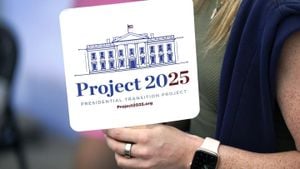Recent developments surrounding Trump Heights, the settlement named after Donald Trump on the Golan Heights, have become pivotal within Israeli politics, especially following the recent election results. This settlement is situated on land Israel captured from Syria during the 1967 war and later annexed, making it inherently contentious. The action of establishing this settlement was first realized during the Trump administration, which sparked intense debate and division both locally and internationally.
The aftermath of the election, where Trump retook the presidency, has intensified discussions about Israel’s territorial claims and settlement policies. Observers note how this political shift may favor the right-wing parties within Israel, which have been advocating for broader settlement expansion.
Most recently, Yechiel Leiter, who has strong ties to the settlement movement, was appointed by Israeli Prime Minister Benjamin Netanyahu as the next ambassador to the United States. This appointment signals Netanyahu's expectation of continued strong support from the United States for Israeli settlements, particularly under the Trump administration, known for its pro-Israel stance.
Leiter's background as an American-Israeli and former settler leader adds to the complexity. He lost his son during combat operations, deepening the political narrative around the potential gains for settlements. His affirmative stance on the settlements aligns with Trump’s previous arrangements, which contrasted sharply with the more cautious approach of the Biden administration.
During his term, Trump’s administration proposed peace plans which included significant recognition of Israeli settlements and allocated portions of the West Bank under Israeli control, which had been controversial and met with fierce opposition from Palestinian representatives. The recognition of Israeli sovereignty over the Golan Heights was also emblematic of Trump's radical foreign policy shifts.
The location of Trump Heights symbolizes not just the direct political alignments but also reflects broader cultural ties between certain sectors of the Israeli electorate and the American Republican base, especially its right faction. The settlement was envisioned as part of the larger political narrative of U.S.-Israeli relations, becoming emblematic of the perceived bond between evangelical Christians and right-wing Israeli policies.
Proponents of the settlement initiative maintain it serves as both strategic and ideological support for Israel's claims to ownership over disputed territories. Conversely, critics argue such settlements impede peace efforts and exacerbate tensions between Israelis and Palestinians, exacerbated by rhetoric surrounding sovereignty and historical claims.
The recent re-election of Trump has prompted celebrations among some segments of the Israeli public, who view his presidency as integral to their aspirations for settlement expansion. Social media was rife with messages congratulating Trump, coupled with optimism for the future of Israeli policies under his leadership.
Those resistant to expansion quickly voiced concerns, noting the potential destabilization such actions could herald for the region. Events surrounding Trump Heights—spanning issues from funding to settlement growth—could significantly influence Israeli-Palestinian relations now, more than ever.
On the ground, many residents of Trump Heights are eager for more extensive infrastructure support from the Israeli government. They anticipate favor from their government under the leadership of Netanyahu, who is seen as increasingly dependent on right-wing coalition members.
Critics warn, though, about the potential backlash from the international community against aggressive settlement policies, especially if Netanyahu continues to push for expansionist strategies as he has implied. With pressures from both leftist and more moderate factions within Israel, the government may have to navigate these turbulent waters carefully.
At the upcoming United Nations session, Netanyahu is expected to face significant scrutiny related to these issues, especially with the potential for rescinding or revisiting the policies initiated under Trump’s earlier administration.
Adding another layer of complexity is the bipartisan nature of U.S. foreign policy with Israel historically. While Trump's relationship with Netanyahu bodes well for ambitious settlers, it raises questions about how future administrations may shift the focus back to negotiations over unilateral actions.
Political scientists are closely watching how this settlement and the election results will impact broader Middle Eastern geopolitics. The echoes of both the Golan Heights and any renewed settlement expansions are likely to resonate within numerous regional conflicts and dialogue centered on peace negotiations.
Trump's influence can already be spotted as various pro-Israel lobbying groups begin to reassert their presence, calling for favorable legislation supporting settlements. Some argue this could usher new dynamics around community funding and infrastructure enhancements aimed at solidifying Israeli control over disputed territories.
Meanwhile, the Palestinian leadership has reiterated their grievances, warning of the adverse effects this settling spirit could bring about, particularly on prospects for peace talks.
Leiter is set to start his term just as Netanyahu’s government faces challenges related to its sustainability amid rising tensions. The appointment of right-leaning advocates like Leiter might inch Israel’s policies toward more aggressive stances on territorial sovereignty.
The global response to these developments will be equally telling. While Trump may have embraced these changes, how long this permission lasts within the international sphere remains to be seen. Certain U.N. resolutions condemn settlement expansions, leaving Netanyahu to navigate the dance between domestic pressures and the risk of alienation from traditional allies.
On the international stage, analysts predict the U.S.’s position may undergo scrutiny as tight adherence to Israel’s settlement policies diverges from the established norms anticipated by the wider global community, especially when diplomatic relations with European nations are considered.
All parties engaged—residents at Trump Heights, the Israeli government, the Palestinian leadership, and international observers—remain anxious around the continued evolution of this settlement saga. The region watches closely, bearing witness to the culmination of ambitions, resentments, and expectations embodied within the continuing story of Trump Heights.
Netanyahu’s strategic maneuvers will likely aim to bolster domestic support, yet each foothold gained through settlement could equally be seen as potential diplomatic losses on the world stage. Balancing these dual narratives won't be easy, as the reverberations from this latest political shuffle ripple beyond Israeli borders.



